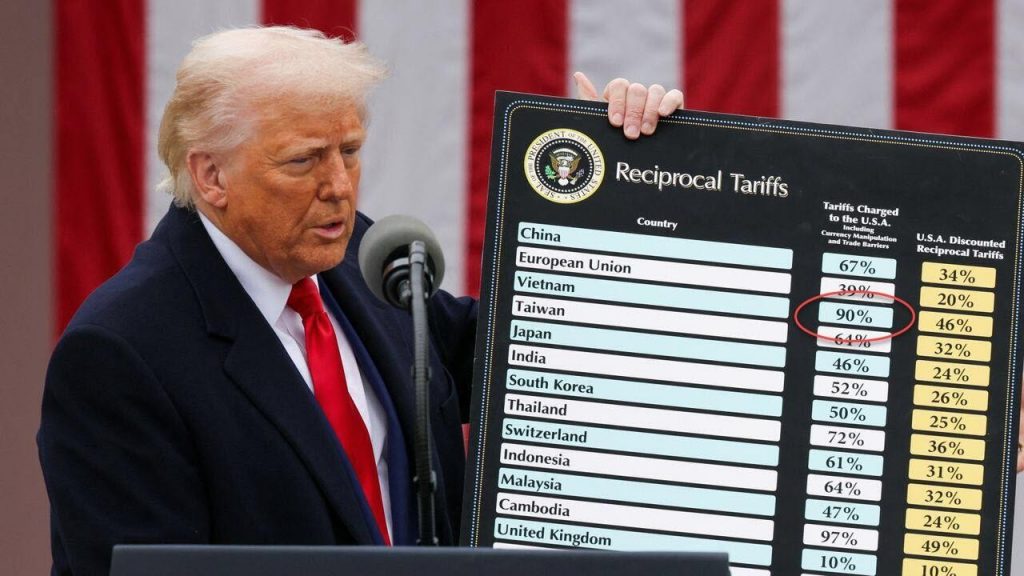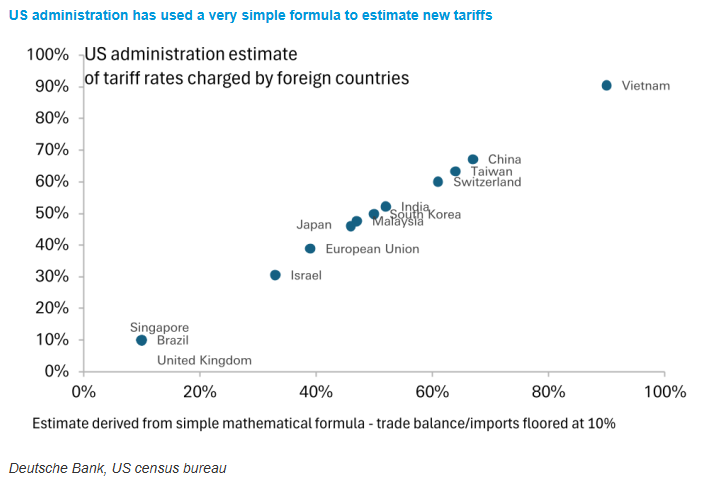Monday blog
Not since the Chinese lab-leaked covid plague and the imposition of the ‘safe’ and ‘effective’ fake but hugely profitable vaccines have I seen much utter nonsense from the mainstream media as we’re now getting over Trump’s trade tariffs.
We’ve been told by the ‘experts’ that Trump is starting a trade war, that Trump’s tariffs will cause a world-wide recession, that Trump’s tariffs show he is economically-ignorant and has learnt nothing from the results of tariffs being introduced in the 1930s Great Depression, that Trump’s tariffs are a ‘lose-lose’, that Trump’s tariffs are a ‘catastrophe’ for the world and so on and so forth.
It’s all rubbish, nonsense, worthless blethering from the Trump-loathing mainstream media.
When Trump introduced his trade tariffs, he held up a chart showing the tariffs on US goods imposed by countries trading with the US and beside those figures, the reciprocal tariffs being brought in by the US. But this wasn’t the start of a ‘trade war’:

It was merely the start of a negotiation. Trump was saying something like: ‘we will put the same tariffs on you as you put on us. If you want us to drop our tariffs, then you have to drop the tariffs you put on US goods’. It’s that simple.

From the little I understand, around 50 countries have already been in contact with the US administration over negotiating a new trade deal with the US involving both sides reducing tariffs. Taiwan and Vietnam have already asked for new trade negotiations. I expect many more countries will follow.
The interesting cases will be China and the EU.
China: The Chinese Communist Party (CCP) doesn’t want to be seen as weak and thus losing face. So the CCP has already put increased tariffs on American imports. This will hurt the Chinese population much more than it will hurt the US. Many of the products China exports to the US are ‘discretionary spend’ – they are seldom life’s essentials – people can choose whether to buy them or not. But most of the products the US sends to China are agricultural – food. China is already in a terrible recession as the more belligerent Xi PingPong acts towards Taiwan, the more many Western companies are trying to avoid political risk by moving production from China to countries like Vietnam, India and Mexico. Though, in a recent case, Foxcomm moved production of some electronic products to India. But they were so infected with ecoli and other nasties that production had to be moved back to China. It appears our Indian friends haven’t yet learnt some basic rules of toilet hygiene. Nevertheless, millions of Chinese workers haven’t been paid for months, millions more have lost their jobs and some Chinese business owners have been grabbing whatever cash they can lay their hands on and scarpering. So a large increase in food prices caused by the CCP imposing tariffs on food from the US is going to seriously damage many of the poorest in China.
The EU: The first instinct of EU bureaucrats is to want to start a trade war with the US as, like the CCP, the eurocrats don’t want to appear weak and lose face. Certainly they don’t want to be seen to be pushed around by the much-hated Trump. Moreover, like in the UK, those ruling Europe have only contempt for those whose lives they control. So the EU elites will think nothing of starting a tariff war with the US if they feel it bolsters their power however much damage it does to EU countries’ economies. Macron and whatever nonentity is now German’s Chancellor are already beating their chests and ‘bravely’ bellowing their defiance to the Trump tariffs. It will be interesting to see whether the other EU leaders are willing to follow the French and Germans into a trade war with the US. I suspect not.
Britain: The UK is stuck in a bit of a quandary. Congenital liar Starmer is desperate to drag the country back into the EU. And dragging us into a trade war on the side of the EU against the US would give Starmer yet another excuse to move us towards rejoining the EU. On the other hand, given that tariffs on UK exports to the US are only 10% compared to 20% for the EU, it might be difficult for even such an accomplished liar such as Starmer to jump into bed with the EU against the US.
And for those who believe I am writing nonsense, here’s one of many models of how to do a negotiation:
What are the five 5 rules of negotiation?
- Information is Power — Expert negotiators often enter negotiations with arguments intended to persuade the other side of the legitimacy of their positions. …
- Maximize Your Leverage. …
- Employ “Fair” Objective Criteria. …
- Design an Offer-Concession Strategy. …
- 5 Control the Agenda
That seems to me to be pretty much exactly what Trump and the US trade negotiators are doing.














Trump is a megalomaniac. This isn’t negotiation. Negotiation would have started with Trump asking for other countries to remove their tariffs. The point you have never considered is that tariffs or any form of sanction increase the costs to consumers and limits their choice of goods. Starmer says he will use “industrial strategy”, which means more state control of business and more taxes to pay for it. If America has a problem it is because previous administrations failed and Trump is effectively blaming other countries not his own.
Starmer seems to have accepted we cannot do anything without hurting their beloved EU so is going to do as little as possible. The media seem to think he has scrapped the green diktat for vehicle manufacturing but it appears he has just aligned us back with the EU which never caught the Boris madness when his wife and bestie Zak somehow persuaded him to destroy UK industry sooner rather than later. He has been making noises about joining the EU carbon trading scheme but i seem to recall Gideon Osborne made our scheme far stricter than the EU many years ago so this presumably is another attempt to align us back to the EU softer green laws.
Maybe Starmer is for once happy to follow Sir Humphrey’s advice in managing a crisis:
Stage 1: We say nothing is going to happen.
Stage 2: We say something may be about to happen, but we should do nothing about it.
Stage 3: We say maybe we should do something about it, but there’s nothing we can do.
Stage 4: We say maybe there was something, but it’s too late now.